Class 10 English Main Course Book Unit 6 National Integration Chapter 2 Challenges to National Integration
Textual Exercises
Question 1.
Read the poem given below and answer the questions that follow.
Where the Mind is Without Fear
WHERE the mind is without fear and the head is held high Where knowledge is free
Where the world has not been broken up into fragments By narrow domestic walls
Where words come out from the depth of truth Where tireless striving stretches its arms towards perfection Where the clear stream of reason has not lost its way Into the dreary desert sand of dead habit –
Where the mind is led forward by thee
Into ever-widening thought and action
Into that heaven of freedom, my Father, let my country awake.
— Rabindranath Tagore
- Why does the poet say, ‘Where the mind is without fear’ ?
- What are the narrow domestic walls being referred to ?
- Why are they ‘narrow ’ ?
- How /when does the ‘clear stream of reason’ lose its way ?
- What is the poet’s appeal ?
Answer:
- The poet says this because there is no fear where he lives. There is no social division, no discrimination and no exploitation of man by man. There is freedom of every kind.
- The narrow domestic walls are referred to as superstitions, beliefs and narrow-mindedness. These lead to social or communal fragmentation.
- These walls are narrow because of religious narrow-mindedness and fanaticism. The ‘clear stream of reason’ loses its way into a fearful desert of fixed or narrow-minded ideas. In other words, dead ideas, old beliefs and superstitions blind the mind. In India these don’t choke rationality.
- The poet’s appeal is that his country, that is, India, should awake into the world of ever-widening thought and action. This world is heaven-like full of freedom and free of any religious fanaticism or narrow-mindedness.
Question 2.
SWOT ANALYSIS OF INDIA
S : Strengths
W : Weaknesses
O : Opportunities
T : Threats
SWOT analysis is a tool used to develop effective strategies and plans for the progress and development of organizations, companies, institutions and even individuals. Working in groups, identify the strengths, weaknesses, opportunities and threats for our country. Present your group’s views to the class. Your brief presentation should conclue with a ‘vision statement’ for India-where you want our country to be, say ten years from now and what we should do to achieve it.
Answer: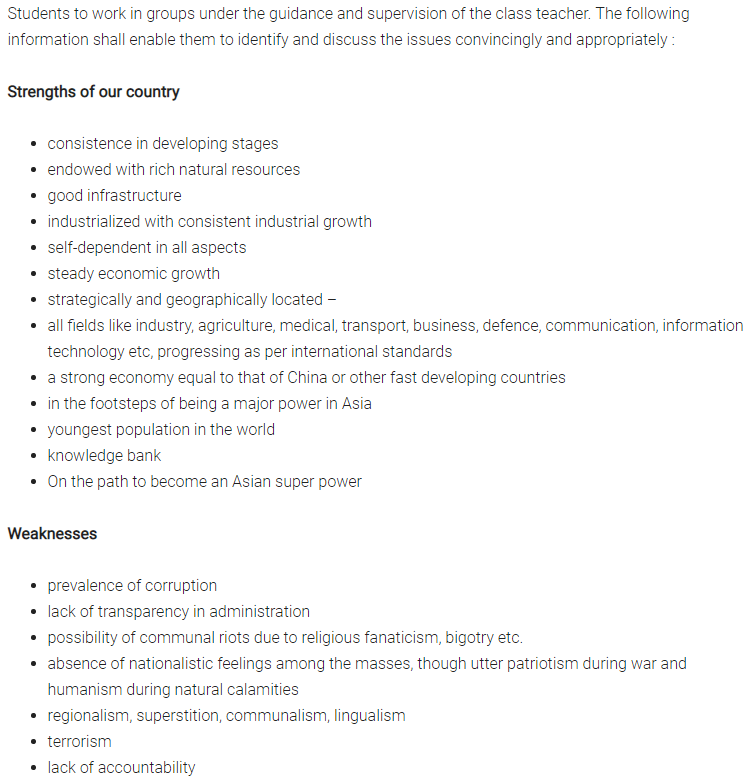
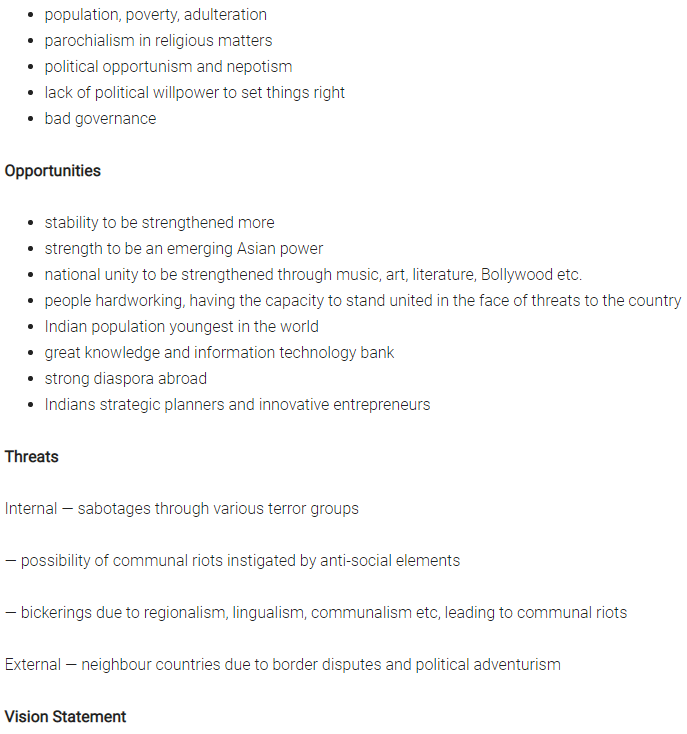
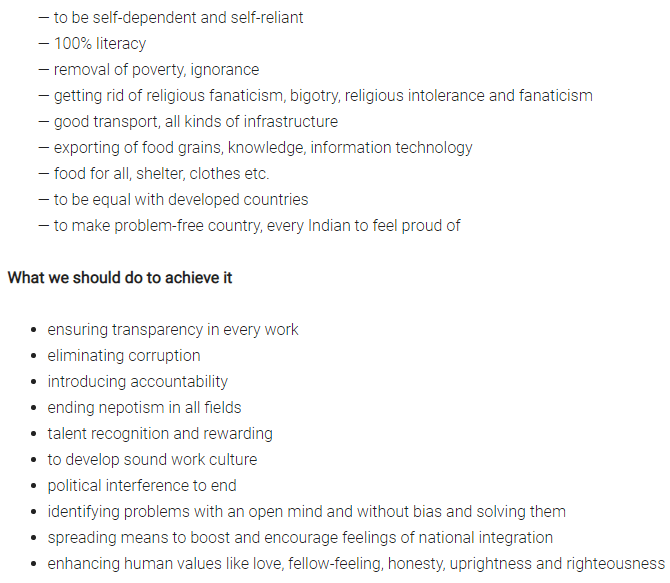

Question 3.
On the basis of your reading of the passage answer the following questions by ticking the most appropriate options. Give reasons for your choices.
Answer: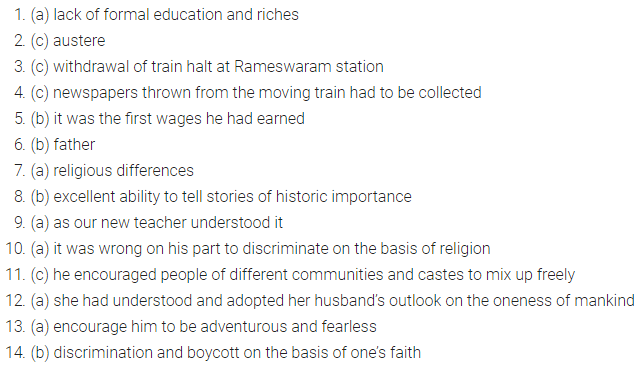
Question 4.
Complete the following sentences.
(a) An example of the generosity and kindness of Kalam’s parents is …………….
(b) Kalam feels he had a very secure childhood because …………….
(c) The suspension of train halt at Rameswaram station proved to be a blessing in disguise for Kalam because …………….
(d) Kalam continues to feel proud about the money he had earned in childhood by picking up bundles of newspaper because …………….
(e) Some traits and values Kalam and his siblings inherited from their parents were …………….
(f) The salient feature of Kalam’s relationship with his three childhood friends was that …………….
(g) Two unique examples of communal harmony and brotherhood of mankind are …………….
(h) The nation should be wary of people like the grade V teacher of the narrator because…………….
(i) However, the country needs more and more people like Kalam’s Science teacher Sivasubramania and Kalam’s mother and grandmother because …………….
(j) Kalam’s second visit to his science teacher’s house surprised him because …………….
Answer: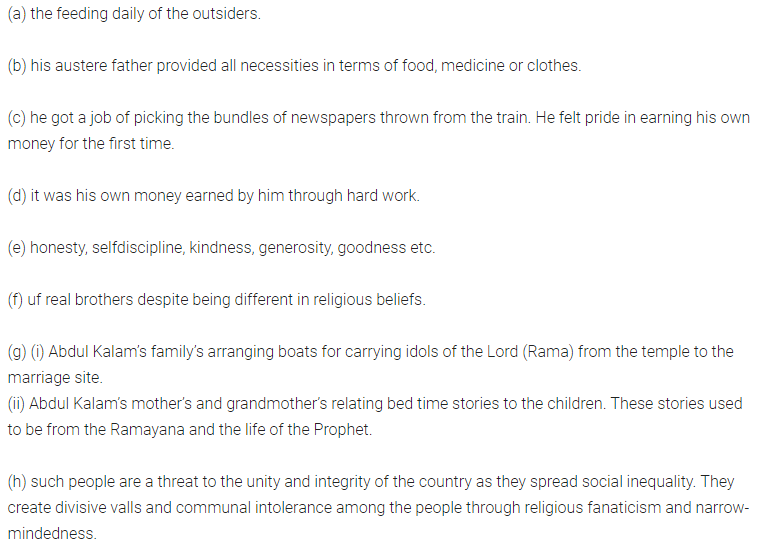

Question 5.
Role Play :
Your teacher will divide the class into groups of four and ask them to act out the following roles :
Kalam
Ramanadha Sastry
Aravindan
Sivaprakasan
In your group you should play the role allocated to you by engaging in a conversation in which the friends
(a) Express surprise and joy at meeting each other after nearly fifty years
(b) Fondly recall their childhood times
(c) Compare the problems facing the country then with the problems she is facing now.
(d) Discuss what can be done to rid her of these problems (Refer to the SWOT analysis of India)
After the role play, your teacher will invite some of the groups to share with others what problems they discussed and the solutions they proposed.
Answer: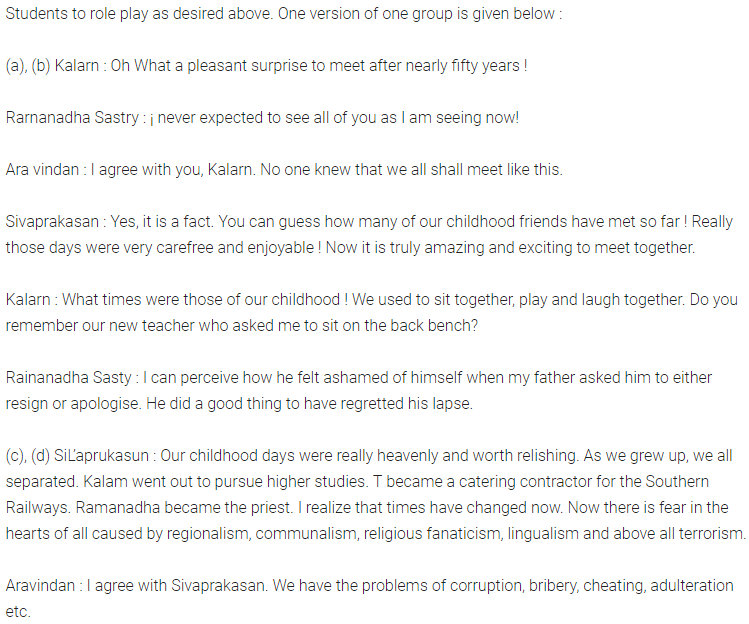
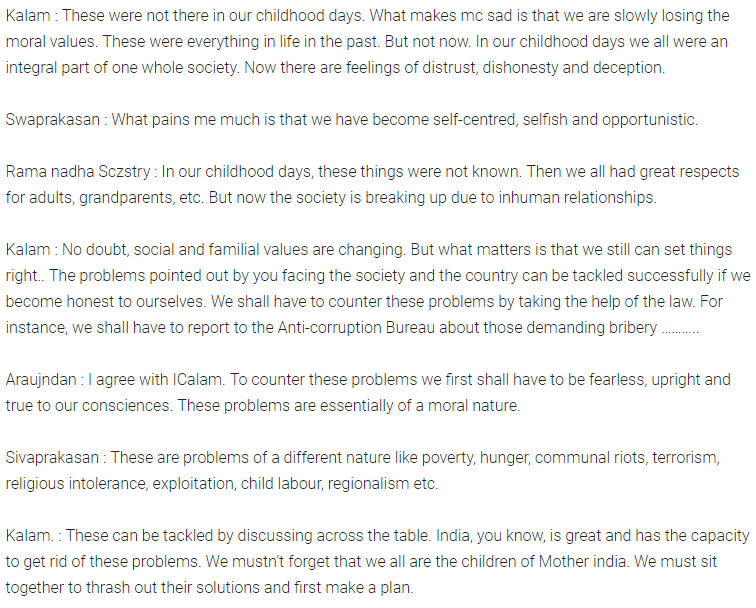
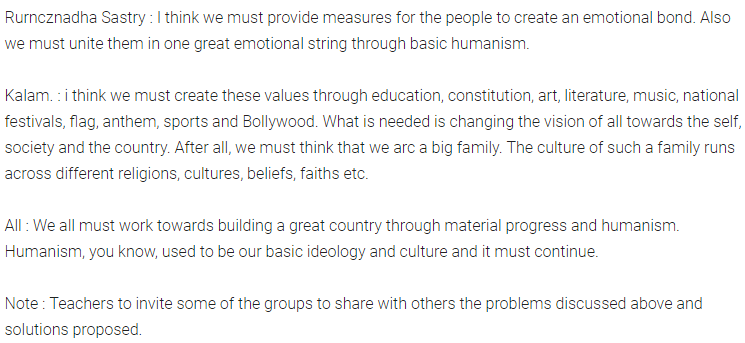
Question 6.
Diary Entry :
Suppose you are Kalam/Ramanadha Sastry. You are upset about being made to sit away from your best friend in the class. Write a diary entry expressing your feelings and reactions. In your diary entry you should
(a) Describe the incident briefly
(b) Say how you and your friend felt about it
(c) Decide what you are going to do about it
Answer: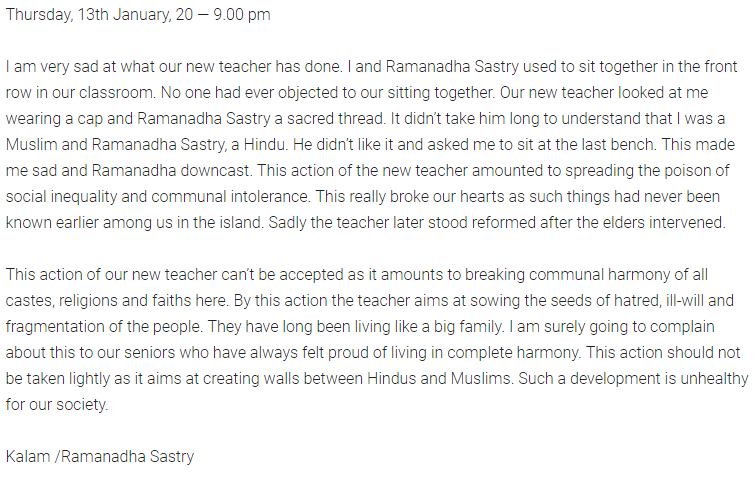
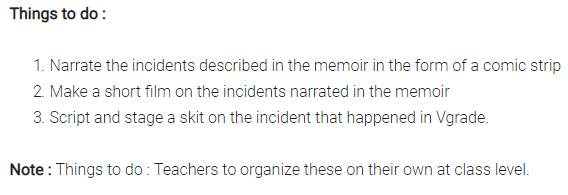
Question 7.
Vocabulary
Read each of the following sentences from the story and tick the word/phrase that gives the correct meaning for the italicized words/phrases in the context in which they are used here.
Answer: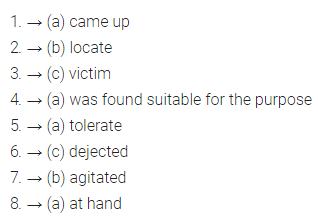
Question 8.
Phrases
Match the phrases in Column A with their meanings in Column B
| Column A | Column B |
| (a) break out | (i) to try to find somebody or something |
| (b) to look for | (ii) as a rule or in general taking all relevant factors into account |
| (c) to take over | (iii) start suddenly and strongly |
| (d) to go into | (iv) to obtain or assume control of something, or gain control of something from somebody else |
| (e) on the whole | (v) to begin a job or career in a particular area of activity |
Answer:
(a) → (iii)
(b) → (i)
(c) → (iv)
(d) → (v)
(e) → (ii)
Question 9.
Write a letter to the editor of a leading newspaper/an article for your school magazine on ‘Celebrating Diversity, but Working for Unity”
Answer:
198, Sector 14
Gurgaon
18th September, 20 – –
The Editor
The Daily Times
New Delhi
Subject : Celebrating Diversity, but Working for Unity
Dear Sir
Kindly publish the following views of mine on the above subject in the appropriate columns of your esteemed daily.
Life becomes beautiful if there is diversity but coupled with unity. If there were uniformity there could not be or have been any charm. This factor is available almost everywhere in nature, in animals and in human beings. So it must be and is in our beautiful country. All places, regions and human beings are not alike, yet they are the same. So we must celebrate this diversity but must work for national unity as we all are Indians—Children of the same mother, Mother India.
We all are the sons and daughters of our Mother India. We have different religions, sects or creeds, different festivals, different traditions, beliefs and customs, yet we are Indians. Our focus should be on celebrating this diversity. We should celebrate the festivals of other communities and live in perfect peace and harmony. For instance, if Muslims celebrate Diwali or Hindus celebrate Id or Christmas, love between them becomes all the more deep and cemented. Then we should partake in social functions like marriage, birthday celebrations or other joyous occasions of other neighbours belonging to different religions. This shall cement our relations at social level. But we should never forget that we all are Indians.
Thanking you
Yours faithfully
Praveen
Question 10.
Assignments
- If you were in the selection committee for the National Integration Award who would you choose and why ?
- Design a stamp in honour of your hero that captures the important moment of his contribution. You could create a fictional hero also.
Answer:
1. In that case I would choose a person with the following attributes/qualities :
(a) He must have a broad outlook of life.
(b) He mustn’t be narrow-minded, communal, a religious fanatic, a linguist, an egoist, etc.
(c) He should have the capacity to inspire the people of all races. id) He must be altruistic, selfless and inspiring.
(e) He must be secular in his beliefs ; should be respectful to all religions, races and communities.
(f) He must not be superstitious, a bigot, exploiting or invested with vested interests.
(g) He must be trustworthy, dependable and a man of integrity.
(h) He must have the capacity to generate love in the masses for the country.
Note : Students may add a few more points from their own side.
2. Students to design a stamp as desired. They could consider the above points in drawing out their own stamps, as desired.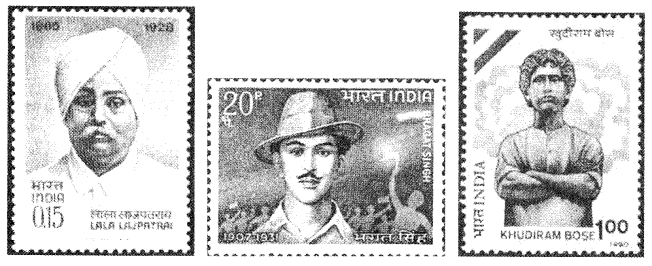
Question 11.
The following passage is an excerpt from an article presented by the author at a meeting organized to observe the national integration week (19-25 November) by the India— Canada Association and the High Commission of India on 25th Nov. 2009.
Read it carefully and answer the questions that follow :
CHALLENGES TO NATIONAL INTEGRATION
SUMMARY
Indian population comprises many different races, religions, cultures and languages. So national integration becomes very important. To ensure progress, all societies need to be brought into one single nation with a national consciousness. National integration should aim at improving socio-cultural relations, reducing economic inequalities and strengthening unity and solidarity. The forces that challenge national integration are : regionalism, communalism, religious fanaticism, lingualism and terrorism. The feeling that nation comes first is no more very important. People with personal and vested interests threaten the national integration.
Regional aspirations of the people may be dangerous for the country as these can break it up. Communalism may encourage communal riots. Religious fanaticism is equally dangerous for national integration. India is a secular country but this has not solved all problems. Mahatma Gandhi said that he was a Hindu, a Moslem, a Jew, a Christian, a Buddhist. Nehru was horrified at the spectacle of religion and condemned it. Religion for him stood for dogma, bigotry, superstition, exploitation and the preservation of vested interests. Rabindranath Tagore held humanity above anything else.
To achieve national integration we must identify the force that binds the people of the country and creates an emotional bond. Constitution, territorial continuity, art, literature, music, national festivals, national flag, anthem, sports and Bollywood can be exploited to promote national integration. Economic development of the regions should be of primary importance. The education system should be revised with the aim of fostering national integration. Means in education should be adopted to instil a sense of belonging and unity in the mind from childhood. The American song by Paul Robeson is very appropriate in this context. It, metaphorically, sees all the people in one boat.
The writer thinks that one important point is there for national integration that is often ignored. Exercise of power or authority may be successful temporarily but fails in the long run. Internal freedom of the people must be attained first. This is a mind free of selfish ego and aware of basic values and humanity in general. Such a free mind remains open to other cultures, religions and languages. It also accepts different people of the country.
Question 12.
Based on your reading of the passage answer the following questions :
(a) Why is national integration important for a country like India ?
(b) What are the aims of national integration ?
(c) What are the forces that challenge national integration ?
(d) What are the steps that we should take to strengthen the nation and its unity ?
(e) How can we bind the people of the country and ci^am an emotional bond ?
(f) How can we attain internal freedom for the people of the country ?
Answer:
(a) National integration is important for a country, like India because it has different races, religions, cultures and language groups of its population.
(b) The aims of national integration are : improving socio-cultural relations ; reducing economic inequalities ; and strengthening unity and solidarity.
(c) These forces are : regionalism ; communalism, religious fanaticism ; lingualism, terrorism.
(d) First, we must identify the force that may blissfully bind the people of the country. We should create an emotional bond and help them share common ideas and values,
(e) We can bind the people of the country in one thread. We can also create an emotional bond through art, literature, music, national festivals, national flag, anthem, sports and finally, Bollywood.
(f) We can attain internal freedom by creating the importance of basic values of life. These are : humanity, mutual love, respect, trust and the feelings of‘ownness’. We should try to create a ‘true mind’ which accepts different people of the country.
Question 13.
Read the passage carefully and familiarize yourself with the new words used in the passage by working out their meanings. Match the words in column A with their meanings in column B.
| Column A | Column B |
| (a) foster | (i) the act of accepting someone as a part of a group |
| (b) pernicious | (ii) excessive enthusiasm for an extreme political or religious cause |
| (c) integration | (iii) encourage the development of |
| {d) fanaticism | (iv) agreement and support resulting from shared interests, feelings or opinions |
| (e) solidarity | (v) having a harmful effect. |
Answer:
(a) → (iii)
(b) → (iv)
(c) → (i)
(d) → (ii)
(e) → (iv)
Question 14.
Organize a group discussion on the topic : “Destabilizing Forces Within a Country : Challenges to a Nation”.
Answer:
Teachers to supervise the GD as desired in this question. A sample ofGD on the topic is given below :
A : There is no doubt that today the country faces the challenge of breaking or weakening the country by some destabilizing forces. These are operating within it. These threaten the national integration and the very roots that make the country great. These challenges are : regionalism, communalism, religious fanaticism, lingualism, terrorism etc.
B : I would say that the most ferocious destabilizing force of all these is terrorism. It is the most violent and destructive and a threat to our age-old culture.
C : I agree with B that terrorism has now become the worldwide force to destabilize the world peace. No one knows how many innocent lives will have to be sacrificed before this monster is wiped out completely and peace is restored throughout the world.
D : I personally feel that we need to identify the forces that blissfully bind the people of the country. These create an emotional bond and help them share common ideas and values. These are like art, music, literature, national functions relating to national flag, anthem, sports and finally Bollywood …. These can be attained through various means.
A : I would further say that we can cement the forces of our being children of our Mother India by celebrating the festivals of all communities. Secondly, we must create an education system that enhances the humanism, fellow-feeling, compassion, pity, mutual trust and faith ….
B : I agree with A. In addition, I would say that we must aim at the economic development of all communities. We should nurture a feeling that they all are not aliens but our own if they have a different faith, caste, creed or religion. After all, they are human beings, born of this soil. They are the faithful soldiers to protect the Motherland.
C : For this I would say that the destabilizing and destructive elements that threaten the unity and oneness of the people of the country should be identified. They must be condemned publicly. At the same time, these should be tackled through legal provisions. After all, what one takes after one dies ! We must understand the value of peace and prosperity in ‘Vasudhev Kutumbkam’… .
Poetry
NCERT Solutions for Class 10 English First Flight
- Chapter 1 A Letter to God
- Chapter 2 Nelson Mandela: Long Walk to Freedom
- Chapter 3 Two Stories about Flying
- Chapter 4 From the Diary of Anne Frank
- Chapter 5 The Hundred Dresses – I
- Chapter 6 The Hundred Dresses – II
- Chapter 7 Glimpses of India
- Chapter 8 Mijbil the Otter
- Chapter 9 Madam Rides the Bus
- Chapter 10 The Sermon at Benares
- Chapter 11 The Proposal
NCERT Solutions for Class 10 English First Flight (Poem)
NCERT Solutions for Class 10 English Footprints Without Feet
NCERT Solutions for Class 10 English Supplementary Reader Footprints without Feet
Unit 1 Health and Medicine
Unit 2 Education
Unit 3 Science
Unit 4 Environment
- Environment Introduction
- A. Treading the Green Path: Towards Preservation
- B. Heroes of the Environment
- C. Let’s Clean up
- D. A Tale of Three Villages
- E. Geological Heritage
Unit 5 Travel and Tourism
Unit 6 National Integration
CBSE Class 10 English Workbook Solutions and Answers
NCERT Solutions for Class 10 English Workbook
- Unit 1 Determiners
- Unit 2 Tenses
- Integrated Grammar Practice 1
- Unit 3 Subject – Verb Agreement
- Unit 4 Non Finites
- Integrated Grammar Practice 2
- Unit 5 Relatives
- Unit 6 Connectors
- Integrated Grammar Practice 3
- Unit 7 Conditionals
- Unit 8 Comparison
- Integrated Grammar Practice 4
- Unit 9 Avoiding Repetition
- Unit 10 Nominalisation
- Integrated Grammar Practice 5
- Unit 11 Modals-Expressing Attitudes
- Integrated Grammar Practice 6
- Unit 12 Active and Passive
- Integrated Grammar Practice 7
- Unit 13 Reported Speech
- Integrated Grammar Practice 8
- Unit 14 Prepositions
- Integrated Grammar Practice 9
A. Resource Material
B. Integrated Grammar
.png)
.png)